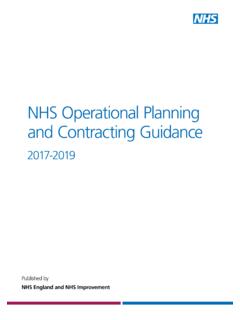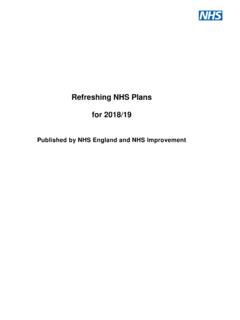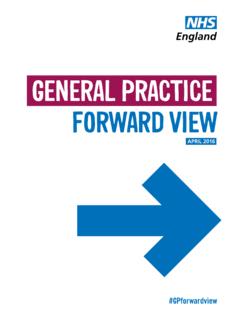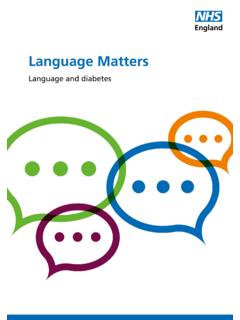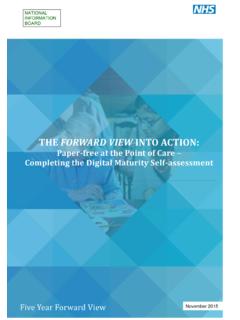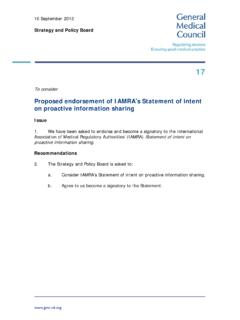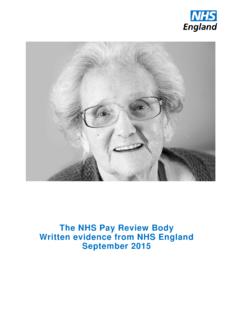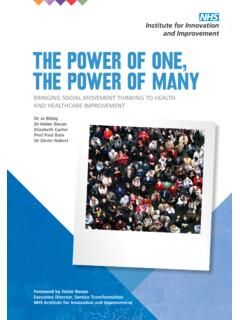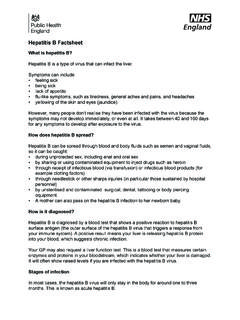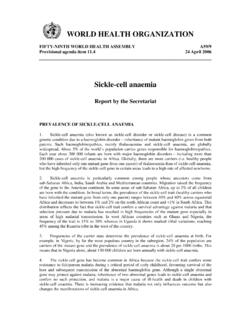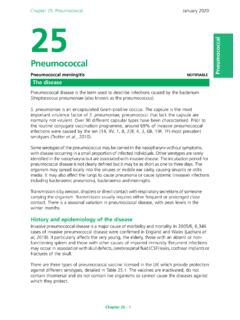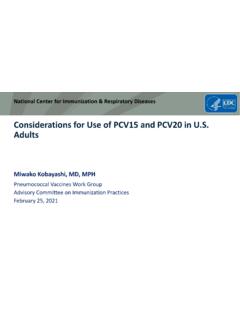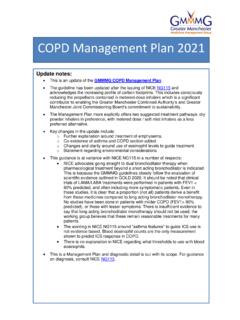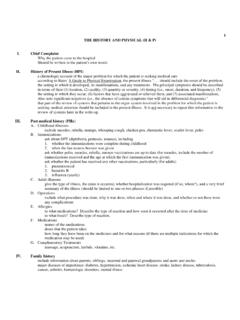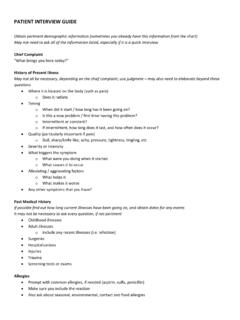Transcription of The national flu immunisation programme 2020/21 - NHS …
1 1 PHE Gateway Ref: GW-1266 NHS England Publishing Approval Reference: 001638 Thursday 14 May 2020 Dear Colleague, The national flu immunisation programme 2020/21 1. Thank you for all the hard work everyone is doing as part of the NHS response to the global COVID-19 pandemic. It is more important than ever that we have effective plans in place for the 2020/21 flu season to protect those at risk, prevent ill-health and minimise further impact on the NHS and social care. 2. We recognise that delivering the flu immunisation programme is likely to be more challenging because of the impact of COVID-19 on our health and social care services. Further guidance will be issued about how to manage the immunisation programme to reflect circumstances nearer the planned start of the progamme in September 2020. Discussions to consider expansion of the flu programme for this autumn are underway, and we will write again with any changes in due course. 3. In the meantime, you should continue to plan for the programme as usual.
2 This letter is to inform you which groups are eligible for flu vaccination this autumn and sets out actions that you can take now to prepare for this autumn s vaccination campaign. 4. In particular, this season it will be more important than ever to ensure that sufficient stocks of the recommended adult flu vaccines have been ordered for your eligible patients. In light of COVID-19, we ask Primary Care providers (General Practices and Community Pharmacies) to urgently review your vaccine orders now to make sure the number of vaccines ordered meet at least national ambitions and previous uptakes rates, whichever is highest. Please do so across your local Primary Care Network ensuring that the Clinical Commissioning Group flu lead is fully appraised of the position. If necessary, you may need to adjust your orders with suppliers. 5. For NHS Trusts and across Integrated Care System arrangements, please review your vaccine orders now to make sure the number of vaccines ordered meets your requirements for a vaccination programme to cover all frontline healthcare workers.
3 The national flu immunisation programme 2020 to 2021 2 Eligibility 6. In 2020/21 groups eligible for the NHS funded flu vaccination programme are the same as last year, although this may change if the programme is expanded, and include: all children aged two to ten (but not eleven years or older) on 31 August 2020 those aged six months to under 65 years in clinical risk groups pregnant women those aged 65 years and over those in long-stay residential care homes carers close contacts of immunocompromised individuals health and social care staff employed by a registered residential care/nursing home, registered domiciliary care provider, or a voluntary managed hospice provider. 7. We expect universal vaccination of health and care workers and further guidance will be published in due course. Prioritising flu vaccine uptake 8. Flu vaccination is one of the most effective interventions we have to reduce pressure on the health and social care system this winter.
4 We are currently seeing the impact of COVID-19 on the NHS and social care, and this coming winter we may be faced with co-circulation of COVID-19 and flu. We understand that planning this year is more challenging with the uncertainties of staff absences, and how long policies around social distancing and school closures will remain in place. However, it is more important than ever to make every effort to deliver flu vaccination. 9. Those most at risk from flu are also most vulnerable to COVID-19. We must do all we can to help protect them this winter. We anticipate that concerns about COVID-19 may increase demand for flu vaccination in all groups this year, and some in at risk groups may have concerns about maintaining social distancing when being given the vaccine. 10. All those eligible should be given flu vaccination as soon as possible so that individuals are protected when flu begins to circulate. Providers should aim to schedule their immunisation services to match vaccine supply, usually from September, and complete vaccination by the end of November, where possible.
5 The national flu immunisation programme 2020 to 2021 3 Service specifications 11. The Directed Enhanced Service (DES) specification for seasonal influenza and pneumococcal immunisation sets out all eligible groups for vaccination (apart from those aged two and three on 31 August 2020). It includes eligible frontline health and care workers working in residential care and nursing homes, domiciliary care providers and the voluntary managed hospice sector. The DES can be found at: 12. There is a separate Enhanced Service (ES) specification for the childhood seasonal influenza vaccination programme , covering the vaccination of children aged two and three years on 31 August 2020. The ES can be found at: 13. General practices are reminded that both the DES and ES specifications require a proactive call and recall system to contact all at risk patients. Various methods for this should be considered such as letter, email, phone call, text or social media and during face to face interactions if the opportunity arises, to encourage people to attend for their vaccination.
6 14. GP practices should also proactively call two and three year olds. This year the national Childhood Health Information System (CHIS) service specification has been revised to include issuing an early communication to advise parents/carers of all eligible two and three years olds that they should access the flu vaccination from their GP practice. These communications are designed to support local call and recall initiatives. It is important that all children are given early protection through the flu vaccine, and GP practices should aim to complete flu vaccination by the end of November at the latest. 15. Community pharmacies offering a flu vaccination service for adults will be required to do so in accordance with the Community Pharmacy Seasonal Influenza Vaccination Advanced service specification for 2020/21 which will be published at: 16. Planning for the school age programme should continue in the context of the current constraints of school closures and staff redeployment.
7 The school age immunisation service specification has a requirement that, to provide early protection, the provider will complete the flu vaccination as early as possible after the flu vaccine becomes available and at the latest by 15 December for all eligible children. School aged vaccination services must actively invite 100% of eligible children. Providers will be required, if asked, to demonstrate that such an offer has been made. The national flu immunisation programme 2020 to 2021 4 Recommended vaccines for the national flu immunisation programme 17. Flu viruses change continuously and the World Health Organization (WHO) monitors the epidemiology of flu viruses throughout the world making recommendations about the strains to be included in vaccines. For further information on the strains for 2020/21 see the WHO website: 18. Providers should ensure that they have ordered adequate supplies of the recommended vaccines for their different patient groups, as set out in the letter from NHS England in December 2019: 19.
8 In summary these are: for those aged 65 and over the adjuvanted trivalent influenza vaccine (aTIV) (with the cell-based quadrivalent influenza vaccine (QIVc) offered if aTIV is unavailable) for under-65s at risk, including pregnant women, offer QIVc or, as an alternative, the egg-grown quadrivalent influenza vaccine (QIVe) 20. The live attenuated influenza vaccine (LAIV) for children should be ordered through ImmForm from centrally purchased supplies and QIVe will be available to order for children in at risk groups aged less than 9 years old who are contraindicated to receive LAIV, in accordance with the letter referred to in paragraph 18. See: 21. Children in at risk groups who are contraindicated to LAIV aged 9 years and over who access the vaccine through general practice should ideally be offered the QIVc from the practice s locally procured vaccine stocks. GP practices offering QIVc to these children will be reimbursed by NHS England and NHS Improvement (NHSE/I).
9 Where QIVc vaccine is unavailable, practices can either offer QIVe ordered through ImmForm from centrally purchased supplies (which will not be reimbursed), or their own locally procured QIVe which will be reimbursed by NHSE/I. 22. The DES and ES specifications state that in order for practices to receive payment for administration and reimbursement of vaccine they will need to use the specific flu vaccines recommended in the NHSEI guidance. 23. The Community Pharmacy Seasonal Influenza Vaccination Advanced Service specification sets out the requirements under which community pharmacies may provide flu vaccinations to eligible adult patients, including detailing the specific flu vaccines which are recommended by NHSE and are reimbursable under this service. The national flu immunisation programme 2020 to 2021 5 Information and training resources for health professionals and PGDs 24. Healthcare practitioners should refer to the influenza chapter in immunisation against infectious disease (the Green Book ) for further detail about clinical risk groups advised to receive flu immunisation and advice on contraindications and precautions for the flu vaccines.
10 This can be found at: 25. Information for healthcare practitioners about the childhood flu programme and the inactivated flu vaccines, and links to training slide sets and flu e-learning programme will be available from: and 26. PHE will develop PGDs that will be available prior to commencement of the programme from: and Conclusion 27. We would like to take this opportunity to thank you all for your hard work in delivering the flu immunisation programme . Your continued efforts mean that we have some of the best flu vaccine uptake rates in Europe. This winter, more than ever, it is going to be a key intervention to reduce pressure on the NHS and social care. 28. We thank you for all your hard work in the most challenging of circumstances. Yours sincerely, Prof Chris Whitty Prof Yvonne Doyle Prof Stephen Powis Chief Medical Officer Public Health England NHS England & NHS & Department of Medical Director & Improvement, national Health & Social Care Director for Health Medical Director Chief Scientific Adviser Protection Any enquiries regarding this publication should be sent to: For operational immunisation queries, providers should contact their local screening and immunisation team.
